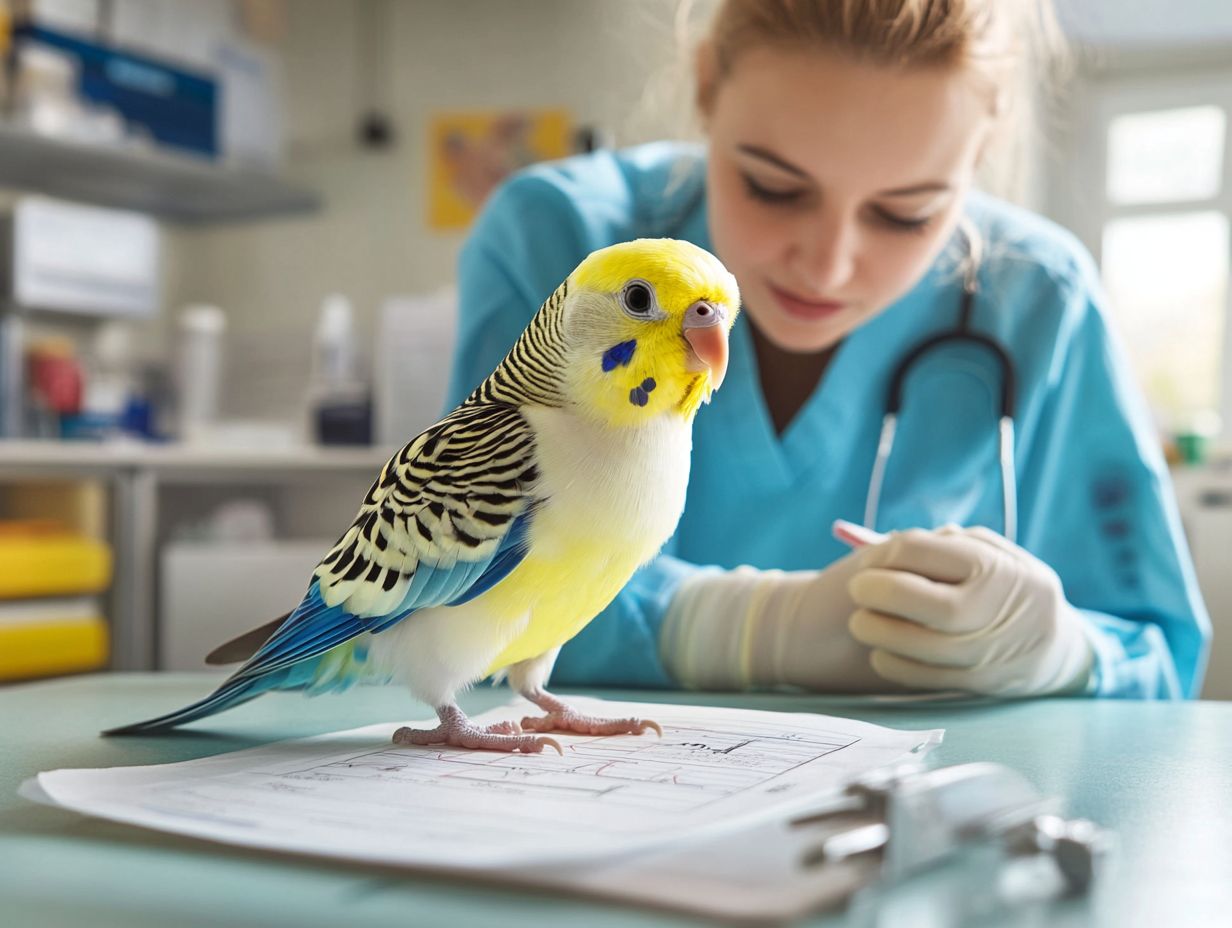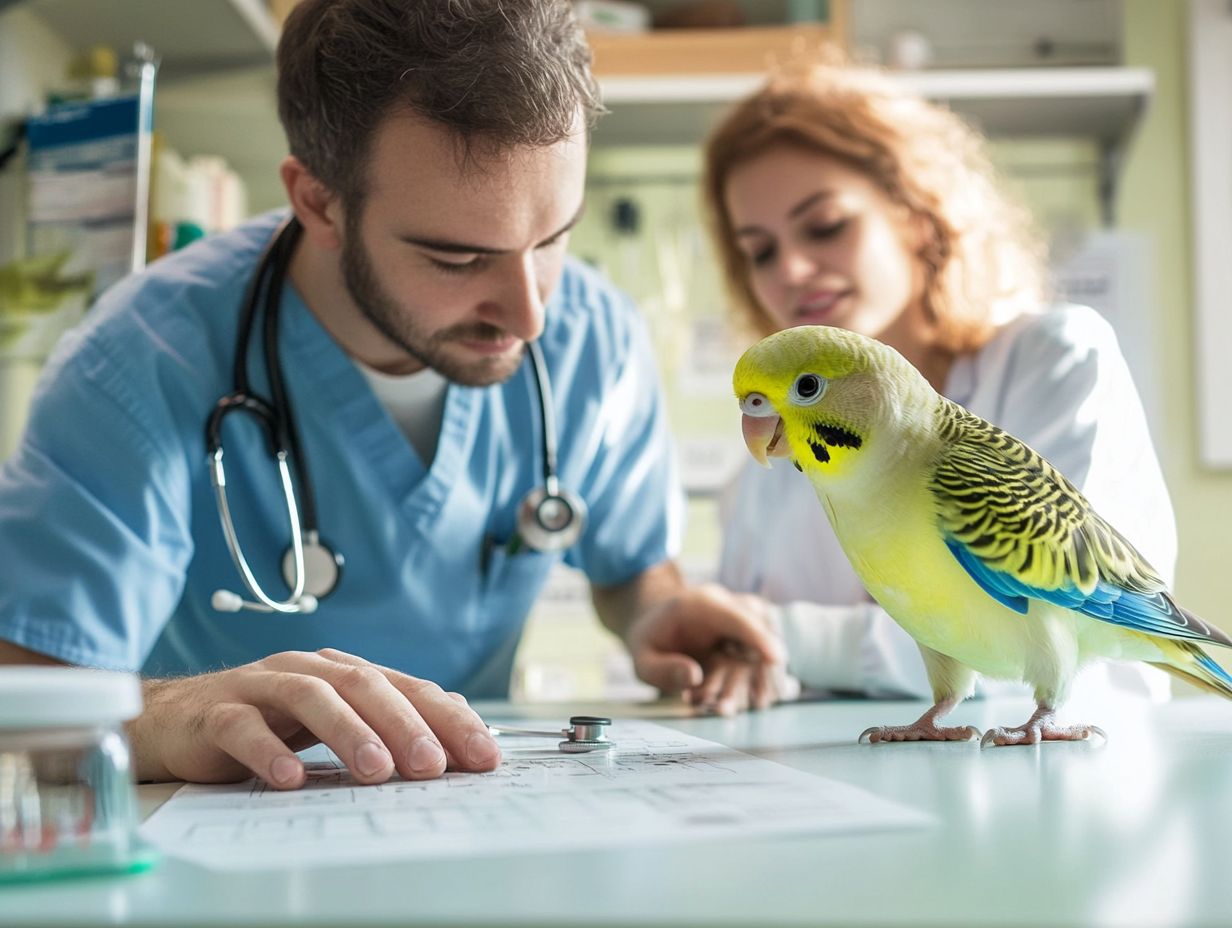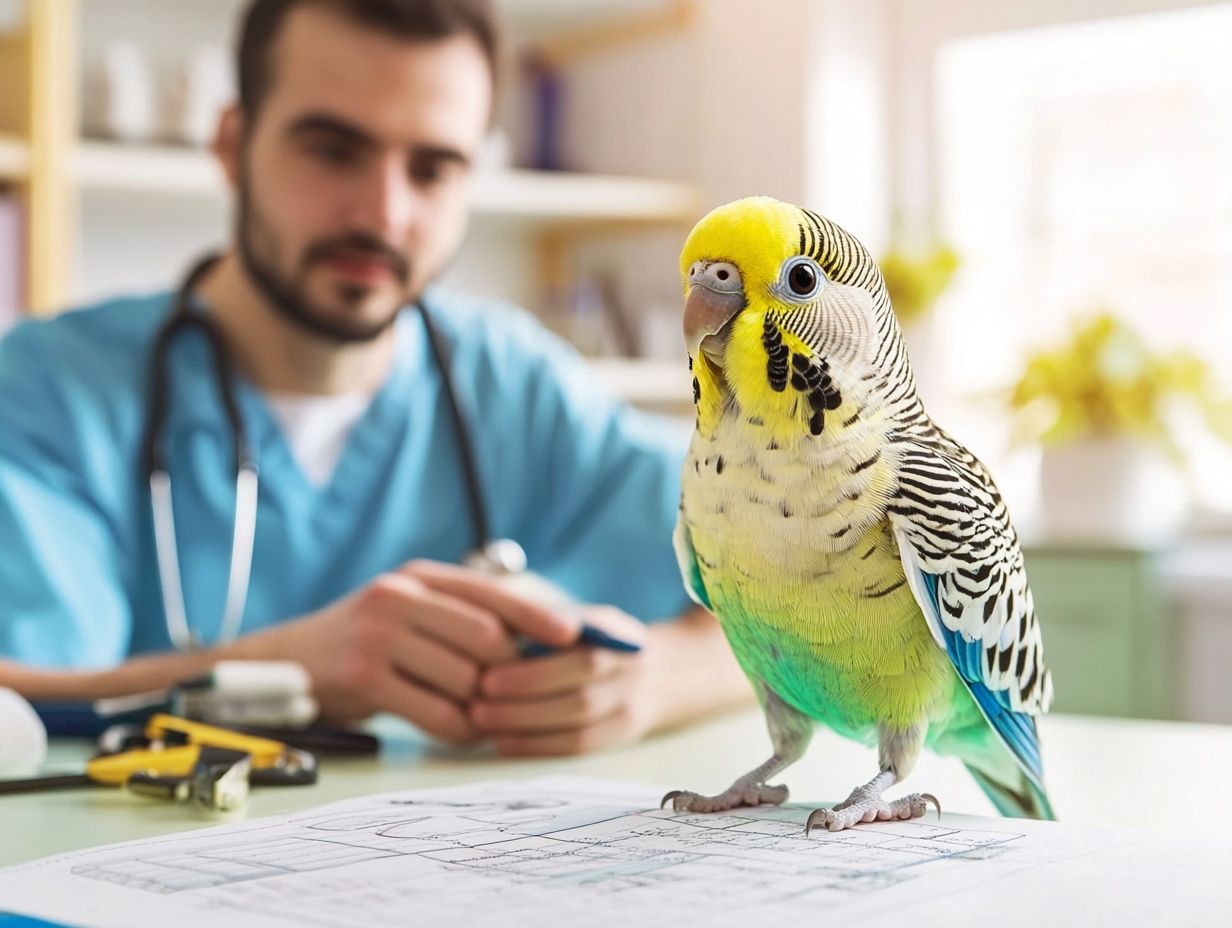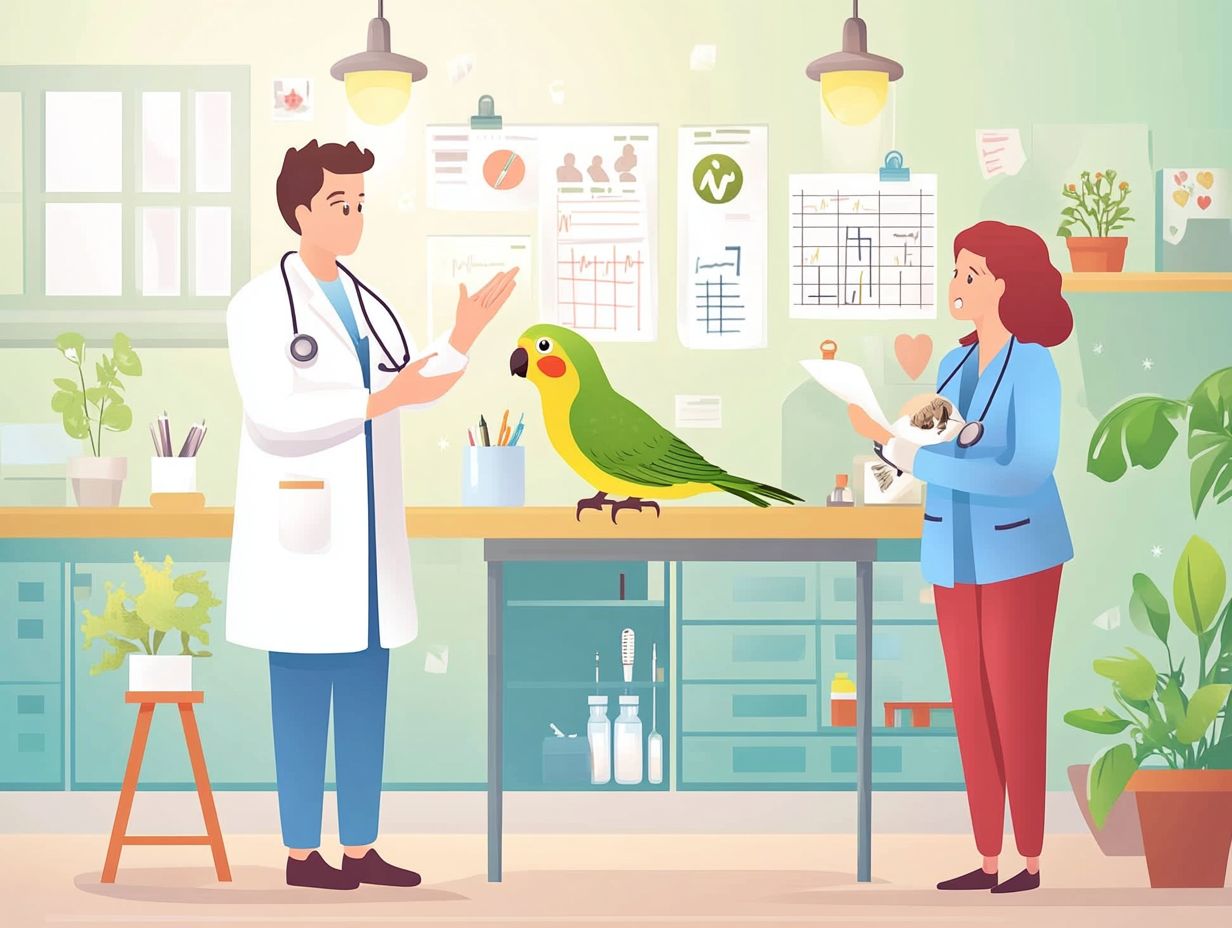Dealing with Common Bird Health Problems
Birds offer a delightful blend of joy and companionship, but like any pet, they aren t immune to health issues that may arise.
As a responsible bird owner, it s crucial to grasp common ailments, recognize symptoms, and understand how to prevent and treat potential problems.
This article delves into the key signs you should keep an eye out for, effective prevention strategies, and crucial moments when seeking veterinary assistance becomes necessary.
It also highlights unique concerns for various bird species, equipping you with the knowledge and tools to ensure your feathered friend remains healthy and happy.
Contents
- Key Takeaways:
- Common Health Problems in Birds
- Identifying Symptoms in Birds
- Preventing Bird Health Issues
- Treating Bird Health Problems
- When to Seek Veterinary Help
- Special Considerations for Different Bird Species, like African grey parrots, Amazon parrots, cockatoos, and conures
- Frequently Asked Questions
Key Takeaways:

- Proper bird care is crucial in preventing and treating common health problems. Regular check-ups and a nutritious diet can help keep your feathered friend healthy.
- Be vigilant in observing your bird’s behavior and physical symptoms. Early detection and treatment can prevent health issues from becoming serious or even fatal.
- If you notice any concerning signs or symptoms, do not hesitate to seek veterinary help. Birds can hide illnesses well, so it’s important to act quickly in case of a serious condition.
Common Health Problems in Birds
Common health problems in birds, particularly parrots and macaws, can greatly affect their well-being and longevity. This makes it essential for you, as a pet owner, to stay vigilant in monitoring your feathered companions.
From avian diseases like Proventricular Dilatation Disease (PDD) and Psittacosis to conditions such as Psittacine Beak and Feather Disease (PBFD), understanding these ailments is crucial for effective care and treatment. Be alert for symptoms like weight loss, changes in appetite, and shifts in behavior. These can signal underlying health issues that need prompt attention from a qualified veterinarian.
Overview of Common Ailments
Understanding the common ailments that can affect your feathered friends is crucial for any pet owner. By learning how to use herbal remedies for bird health, you can address various health conditions that can significantly impact your beloved birds’ overall well-being.
Birds are particularly sensitive creatures, prone to a myriad of health issues ranging from respiratory infections and feather plucking to dietary deficiencies and viral diseases. To ensure their well-being, learn how to identify and treat bird parasites. Stay alert for any unusual signs; catching issues early can make a huge difference!
It’s important to be vigilant for noticeable symptoms such as lethargy, changes in droppings, or unusual vocalizations, as these can signal underlying problems that demand immediate attention. If your bird starts wheezing or struggling to breathe, act quickly and consult a veterinarian for proper diagnosis and treatment.
Generally, addressing these conditions may involve adjusting your bird’s diet, creating a stress-free environment, and, in some cases, administering medications or antibiotics. Being informed about how to identify common bird diseases is essential for ensuring a happy and healthy life for your vibrant companions.
Identifying Symptoms in Birds
Identifying symptoms in birds is a vital part of caring for birds. Early detection of health issues can significantly enhance treatment effectiveness and improve outcomes for your pet.
Be attentive to changes in behavior such as increased lethargy or a shift in appetite as these can signal potential health problems. Physical symptoms, like weight loss or diarrhea, may indicate serious conditions that necessitate immediate veterinary attention.
By regularly monitoring these signs and your bird’s habits, you can ensure that any emerging issues are addressed promptly and effectively.
Signs to Look Out For
When caring for birds, you must be very aware of the signs that can offer critical insight into their health, welfare, and well-being.
Pay attention to any changes in behavior like increased aggression or lethargy because these can serve as early indicators of underlying health issues.
Irregular breathing patterns, such as wheezing or inconsistent rates, should raise an immediate red flag, as they may signal respiratory problems.
Another significant warning sign to watch for is unusual discharge from the eyes, nose, or vent; this can indicate infections or other serious conditions. By keeping a close watch on these signs, you can ensure that any potential issues are promptly addressed, thereby promoting the overall health and vitality of your cherished feathered companions.
Preventing Bird Health Issues

Preventing bird health issues should be at the forefront of your priorities as a pet owner. Proactive care can significantly diminish the likelihood of common diseases and foster a healthier lifestyle for your feathered companions. For more insights, check out understanding bird behavior: health indicators.
Establish a clean and safe environment and offer a balanced diet that caters to their specific needs. Adhere to good pet care practices, as these are crucial steps in safeguarding their overall health and well-being.
Schedule regular check-ups with a veterinarian to catch potential issues early.
Best Practices for Bird Care
Implementing best practices for bird care is crucial for maintaining their health and preventing diseases. This enables you to create the optimal environment for your feathered companions.
Focus on dietary recommendations; offer a balanced diet enriched with vitamins and minerals, incorporating a variety of seeds, fresh fruits, and vegetables.
Craft a stimulating habitat. Ensure the cage is appropriately sized, allows for natural sunlight, and features safe perches. These elements significantly contribute to their overall well-being.
Establish daily routines that include social interaction, mental enrichment, and regular exercise to further elevate their quality of life.
Additionally, keep an eye on environmental factors; maintaining proper humidity and temperature levels promotes a comfortable space for your birds.
Ultimately, these practices work together to foster a healthy and happy bird.
Treating Bird Health Problems
Addressing bird health issues demands a thorough approach that emphasizes precise diagnosis and suitable medication, including antibiotics. For more information, refer to our comprehensive guide on avian health, ensuring your avian companions receive optimal care during times of illness.
Whether it s a bacterial infection that may require antibiotics or a viral disease needing targeted treatments, understanding your options and collaborating closely with a veterinarian can significantly impact the recovery journey.
Act quickly to treat health issues to avert complications and enhance the overall health outcomes for your feathered friend, especially in the case of infectious diseases. For more guidance, check out how to keep your bird healthy and happy.
Medication and Treatment Options
When addressing health concerns in birds, it s essential for you to understand the various medication and treatment options, including antifungal and antiviral agents, available for effective management and recovery.
As a bird owner, you may encounter challenges related to the diagnosis and treatment of common avian illnesses, such as respiratory infections or gastrointestinal issues. Knowing how to handle a sick bird can be invaluable in these situations.
Among the array of medications, antibiotics are crucial in battling bacterial infections. They aid in restoring health and preventing further complications. If the diagnosis calls for it, antifungal and antiviral agents might be prescribed for more specialized treatment.
Getting the correct dosage and administration is vital, often necessitating the use of syringes or specialized avian medication tools to ensure your bird receives the precise amount. By educating yourself about these options, you empower yourself to make informed decisions for your pet’s well-being.
When to Seek Veterinary Help
Understanding when to seek veterinary assistance for your bird is crucial, as timely intervention can greatly influence the outcome of various health concerns. Symptoms like persistent lethargy, significant weight loss, or difficulty breathing should not go unnoticed; they may signal underlying health issues that demand immediate medical attention.
Regular check-ups with an avian veterinarian help catch problems early, ensuring that your feathered companion receives the highest standard of care and monitoring.
Signs of a Serious Condition

It’s crucial to recognize the signs of serious conditions in birds. Infections and anemia are common examples. Early intervention can be the difference between life and death, ensuring a better quality of life for your feathered companion.
As a bird owner, you should remain vigilant for subtle changes in behavior that might hint at underlying health issues. Symptoms like decreased appetite, unusual lethargy, or shifts in vocalization can signify discomfort or illness. Keep an eye out for feather plucking or drooping wings, which could indicate stress or a medical condition.
Other warning signs to watch for include:
- Diarrhea caused by Candida
- Difficulty breathing
By being attentive, you could save your bird’s life!
Special Considerations for Different Bird Species, like African grey parrots, Amazon parrots, cockatoos, and conures
When you care for birds, it’s crucial to understand that each species be it parrots, macaws, cockatoos, conures, or lovebirds comes with its own set of health issues you need to watch for and requirements that demand your attention.
Each species might be predisposed to particular diseases, like Psittacosis or Polyomavirus, which means you’ll need to adopt tailored care and monitoring strategies. Recognizing these distinctions allows you to provide the right diets, habitats, and veterinary care that specifically cater to the needs of your feathered friends.
Unique Health Concerns for Different Types of Birds
Different types of birds come with their own unique health concerns, varying quite a bit among species like parrots, macaws, cockatoos, and conures.
Understanding these specific issues is essential for you as a bird owner, as you’ll likely see different health issues because of each species’ biology and environment. For example, parrots can be susceptible to a disease that causes feather loss and beak deformities. Macaws might struggle with weight-related health issues that can lead to heart problems and liver disease. Cockatoos often face hormonal imbalances that trigger behavioral changes, while conures are particularly vulnerable to respiratory infections, typically indicated by sneezing and wheezing.
Recognizing these signs early on can greatly enhance their overall well-being.
Frequently Asked Questions
What are some common bird health problems?
Common bird health problems include respiratory infections, feather plucking, egg binding, and nutritional deficiencies.
How can I prevent respiratory infections in my bird?

To prevent respiratory infections, make sure to regularly clean your bird’s cage and provide a well-ventilated environment. Avoid exposure to smoke, aerosols, and other potential irritants.
What should I do if my bird is plucking its feathers?
If your bird is plucking its feathers, it could be a sign of stress or boredom. Consult with a veterinarian to rule out any underlying medical conditions and provide enrichment activities for your bird.
What is egg binding and how can I help my bird?
Egg binding happens when a female bird cannot lay an egg. It can be life-threatening, so seek veterinary help immediately.
To prevent egg binding, provide your bird with a balanced diet and proper nesting materials.
What are some signs of nutritional deficiencies in birds?
Watch for signs like weight loss, weak immune function, or odd feather growth. These can indicate nutritional deficiencies.
Ensuring a proper diet and considering supplements can help prevent and treat these issues.
How can I keep my bird’s beak and nails healthy?
Bird-safe toys and perches help keep your bird’s beak and nails healthy. If needed, a vet can trim them.
Avoid sandpaper perches, as they can irritate your bird’s feet.
Make sure to regularly check your bird s health and consult a veterinarian whenever you’re unsure. Your bird s well-being depends on your care!






